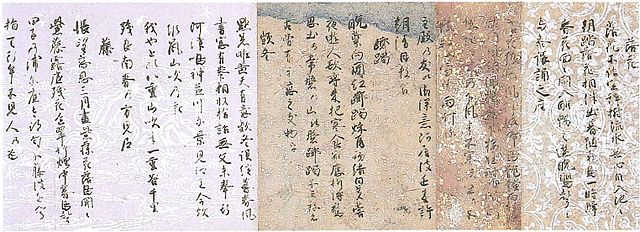Top Qs
Timeline
Chat
Perspective
Fujiwara no Kintō
Japanese poet and bureaucrat (966–1041) From Wikipedia, the free encyclopedia
Remove ads
Fujiwara no Kintō (藤原 公任; 966 – February 4, 1041), also known as Shijō-dainagon, was a Japanese poet, admired by his contemporaries [1] and a court bureaucrat of the Heian period. His father was the regent Fujiwara no Yoritada and his son Fujiwara no Sadayori.[2] An exemplary calligrapher and poet, he is mentioned in works by Murasaki Shikibu, Sei Shōnagon and in a number of other major chronicles and texts.



Remove ads
Biography
Summarize
Perspective
Kintō wrote a great many poems, as well as many poetry anthologies including the Shūi Wakashū and the Wakan rōeishū. He also established the grouping of "Thirty-Six Poetic Geniuses" or "Thirty-Six Immortals of Poetry", the "Anthology of Poems by the Thirty-Six Poets" (Sanjūrokkasen), frequently seen in Ukiyo-e art; he first assembled in 1009–1011 which Fujiwara no Teika would later recommend to study by aspiring poets. The anthology:
- "...contained ten poems each by Hitomaro, Tsurayuki, Mitsune, Ise, Kanemori, and Nakatsukasa, and three poems each by Yakamochi, Akahito, Narihira, Henjô, Sosei, Tomonori, Sarumaru, Komachi, Kanesuke, Asatada, Atsutada, Takamitsu, Kintada, Tadamine, Saigû no Nyôgo, Yorimoto, Toshiyuki, Shigeyuki, Muneyuki, Sane-akira, Kiyotada, Shitagô, Okikaze, Motosuke, Korenori, Motozane, Kodai no Kimi (also read O-ô no Kimi), Nakafumi, Yoshinobu, and Tadami. He served the Heian court in the position of nagon at the same time as Minamoto no Tsunenobu, Minamoto no Toshikata, and Fujiwara no Yukinari, all great poets as well. The four have come to be known as the Shi-nagon (four nagon)."
He was also apparently vital in the compilation of Emperor Kazan's Shūi Wakashū (in which 15 of his poems appear),[3] having compiled between 996 and 999 the original skeleton for it, a collection called Shuisho.[4]
Remove ads
Notes
References
External links
Wikiwand - on
Seamless Wikipedia browsing. On steroids.
Remove ads
